Evaluating the Kessler Scholars Program
Findings from the Academic Year 2022-23
Introduction
Nearly half of all postsecondary students in the United States come from families where their parents did not earn a bachelor’s degree.[1] These first-generation college students are determined, resourceful, and academically resilient, and they bring distinct strengths and perspectives to higher education. However, they face unique challenges upon entering college compared to their peers whose families have a history of college attendance, including less financial support from their families,[2] lower levels of academic preparation during high school, and greater responsibilities outside the classroom.[3] Additionally, they may struggle with their sense of belonging at their institutions.[4] Compared to their non-first-generation peers, first-generation students are 71 percent more likely to leave college in their first year and more than half as likely to complete their degrees in four years.[5]
Various public policies and campus programs have been introduced to address these disparities and improve college persistence and completion for first-generation, low-income, and historically underrepresented students.[6] Historically, these programs focused on specific issues like financial aid or academic under-preparation, but few had a measurable impact on students’ postsecondary outcomes. The emerging scholarship from the past decade suggests that a more coordinated approach—one that aligns support efforts to meet students’ multifaceted needs and holistically engages students’ multiple identities, assets, and experiences—may be more effective.[7] In response, comprehensive support programs have been developed to provide students with multiple forms of assistance, such as academic and career advising, mentoring, and financial aid. However, further research is needed to identify the most effective elements of these interventions, the groups they benefit most, and any long-term gains for employment and earnings.
The Kessler Scholars Program is a comprehensive, four-year, cohort-based program designed to support first-generation and limited-income college students through a combination of financial aid and robust, evidence-informed support programming. With generous funding from the Judy and Fred Wilpon Family Foundation, the program began in 2008 at the University of Michigan (U-M) with an emphasis on undergraduate scholarships and was redesigned in 2017 to focus on first-generation limited-income students. Drawing on the success of the U-M program, five other institutions joined the initiative, including Cornell University, Johns Hopkins University, Queens College, St. Francis College, and Syracuse University. The Kessler Scholars Collaborative was launched in 2020 to support program development at these six inaugural institutions. The Collaborative is a nationwide network that guides program development and implementation, facilitates practice sharing across partner institutions, and provides students with opportunities to connect with other first-generation scholars across the country.
In April 2022, 10 additional institutions were selected to join the Kessler Scholars Collaborative as part of a new collaborative partnership with the American Talent Initiative (ATI), with generous funding support from Bloomberg Philanthropies and the Wilpon Family Foundation. The American Talent Initiative is a coalition of public and private institutions with high graduation rates that are committed to expanding college enrollment and success for low- and moderate-income college students. ATI is co-managed by Ithaka S+R and the Aspen Institute’s College Excellence Program. Each of these 10 new partner institutions received a one million dollar grant to implement the Kessler Scholars Program model and advance the overall ATI goal of increasing postsecondary access and success.
During the first year of the grant, the 10 new partner institutions were given onboarding guidance, programming resources, and support to initiate Kessler Scholars Programs on their respective campuses. Each new campus welcomed its first cohort of scholars in Fall 2023 (which included over 260 scholars across all 10 institutions) and expects to welcome three subsequent cohorts of scholars every year through the academic year 2026-27. While all the new campus programs will serve first-generation, Pell-eligible students, some institutions target specific sub-populations such as students interested in STEM and social impact (Washington University in St. Louis), transfer students (University of Dayton), and rural in-state students (University of North Carolina-Chapel Hill).
Ithaka S+R has served as the external evaluation partner for the Collaborative since 2022 when the network expanded to 16 institutions.[8] The evaluation is a five-year, mixed-methods, formative assessment, which aims to support implementation and maximize impact across the entire network and at each of the 16 participating institutions.[9] This Ithaka S+R evaluation builds on an evaluation of the program’s initial years gathered by the Center for Education Design, Evaluation, and Research (CEDER) at the University of Michigan.[10] In this brief, we provide early insights into enrollment and students’ experiences with the Kessler Scholars Program for the academic year 2022-23.
Evaluation Priorities and Initial Insights
During the academic year 2022-23, the Collaborative’s main aims were to prepare the 10 new campus partners to successfully launch Kessler Scholars Programs and welcome new scholars in Fall 2023, and to encourage ongoing improvement of Kessler Scholars Programs at inaugural campuses. This work involved supporting the hiring and onboarding of new staff, sharing resources and best practices for core programmatic elements, building connection and community across the network of campus partners, and facilitating engagement opportunities.
In line with these activities, Ithaka S+R’s formative evaluation during the academic year 2022-23 focused on assessing the effectiveness of the Collaborative’s support to its network of institutions, learning about program implementation at inaugural institutions and program development at new institutions, and understanding the experiences and outcomes of participating scholars. To do this, we employed a mixed-methods approach which involved analyzing data collected through surveys of students and program staff, interviews with program staff, and tools that track program offerings and student participation. The evaluation team also engaged closely with the leadership of the Collaborative and observed Collaborative-led programs, events, and convenings for program staff throughout the year.
Below, we describe our research questions and share our initial findings.
Who are the Kessler Scholars and program staff that participate in the Collaborative?
The Kessler Scholars Collaborative supports and serves a diverse population of first-generation students across a network of partner institutions, including urban commuter campuses, large public research universities, and small liberal arts campuses. These programs served over 450 scholars across the six inaugural institutions during the academic year 2022-23. Of these scholars, two-thirds identified as women, and 53 percent identified as belonging to historically underrepresented racial or ethnic groups.
Figure 1: Percentage of student respondents by self-reported race and ethnicity (n = 368 students)  Note: Other racial-ethnic categories are not depicted to preserve the anonymity of respondents due to the small sample size. Source: Kessler Scholars 2023 Spring Student Survey.
Note: Other racial-ethnic categories are not depicted to preserve the anonymity of respondents due to the small sample size. Source: Kessler Scholars 2023 Spring Student Survey.
Kessler Scholars Programs are supported by dedicated professional staff at each of the 16 partner campuses. Many of these staff members hold identities similar to those of Kessler Scholars. Of the 45 program staff who lead the campus programs across 16 institutions, 65 percent identify as first-generation college graduates, 56 percent of staff identify as women, and 60 percent of staff belong to historically underrepresented racial and ethnic groups. Additionally, more than two-thirds of the professional staff supporting Kessler Scholars have six or more years of experience working in higher education, and 40 percent of staff have graduate degrees in higher education.
How does the Collaborative support program staff at participating institutions?
The Collaborative supports campus partners in the development and execution of Kessler Scholars Programs. This support includes providing guidance on the program model, organizing and sharing tools and resources for program development and execution, facilitating learning across the network to share knowledge and best practices, and creating a supportive professional community for program staff. Additionally, in collaboration with the external evaluation team at Ithaka S+R, the Collaborative supports evaluation and assessment activities to promote learning and program adjustments.
Meetings with program staff are an important component of the Collaborative’s support. These meetings aim to support the launch of new programs, encourage the continued improvement of existing programs, and contribute to the professional development of program staff. The Collaborative organized 14 virtual group meetings with program staff within the network in the 2022-23 academic year, as well as an annual in-person summer convening. Program staff also met with their designated Collaborative lead an average of four times throughout the year.
The majority of program staff agree that their participation in the Collaborative has been beneficial for developing programming, knowledge sharing across institutions, and their professional development. Ninety-seven percent of program staff find the Collaborative’s support to be highly effective for developing and executing the program, and over 75 percent of program staff find the resources provided by the Collaborative to be valuable and highly useful. Staff expressed strong appreciation for the support and resources provided by the Collaborative to guide program development and execution, especially the one-on-one support provided by the Collaborative’s core staff. They welcomed more opportunities for learning and practice-sharing across institutions and expressed interest in learning more about future data collection activities and translating assessment and evaluation findings into program improvements.
Most program staff are highly engaged in Collaborative-led meetings and convenings. Ninety percent of surveyed program staff say attending these meetings has helped them complete key program activities, including setting clear goals, recruiting scholars, and onboarding new staff. With the expansion to 10 new partners, it will be important that future meetings balance guiding the development of new programs with refining existing programs.
Figure 2: Program staff respondents’ perceptions of the effectiveness of support provided by the Collaborative (n = 32 program staff)
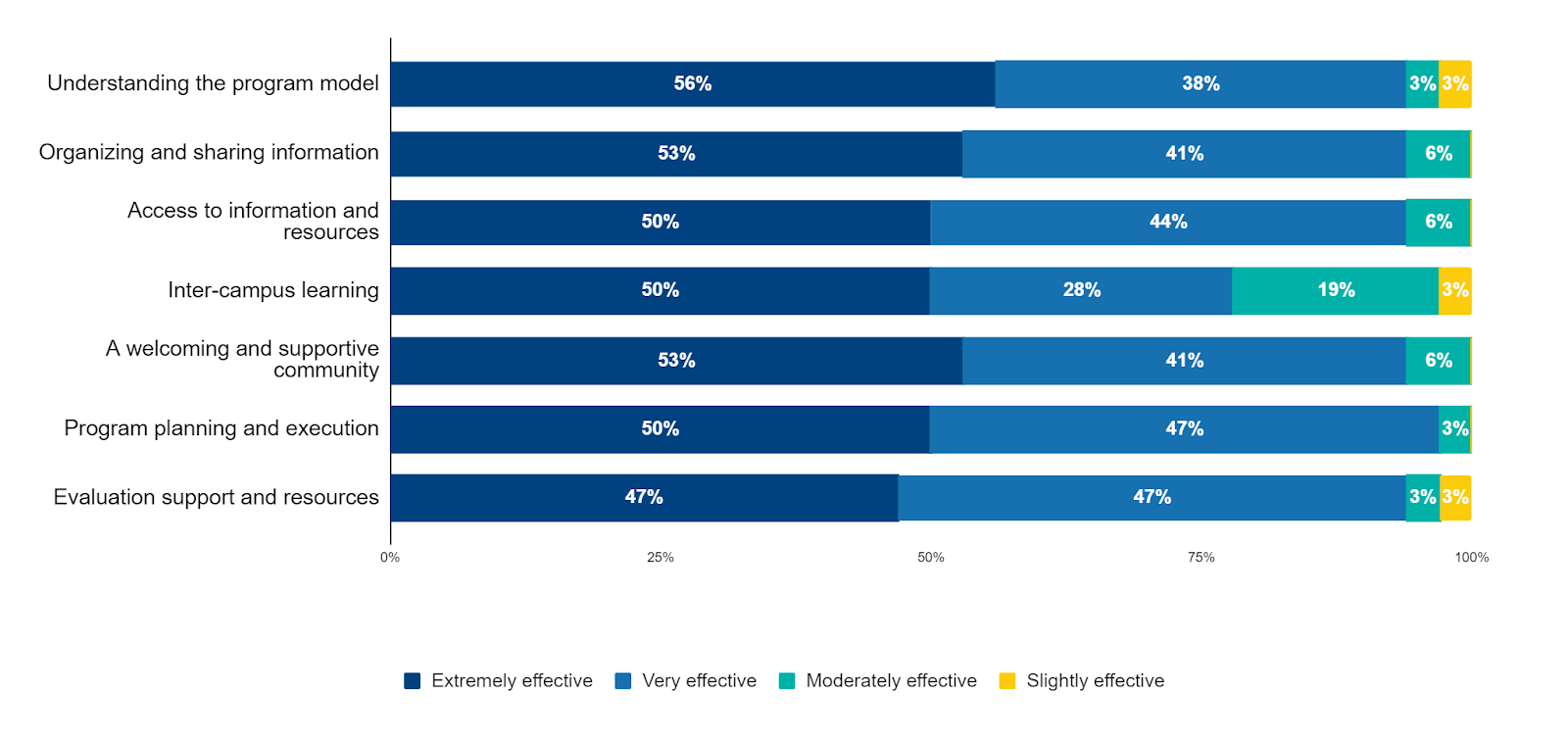 Source: Kessler Scholars Collaborative 2023 Program Staff Survey
Source: Kessler Scholars Collaborative 2023 Program Staff Survey
What were the experiences and outcomes of students who participated in the Kessler Scholars Program?
Background on program activities
Kessler Scholars at each of the six inaugural institutions received individualized academic, personal, and social support from professional staff and other first-generation peers through high-touch frequent interactions and cohort-based activities. These interactions and activities are designed to create a community of support and develop students’ sense of belonging and shared identity. The core program activities include one-on-one meetings, general and cohort-based meetings and workshops, peer mentorship, student leadership opportunities, and community service projects. Examples of these meetings, activities, and workshops include organized trips to nearby cities or states (e.g., an alternative spring break to an urban farm and a trip to the Smithsonian in Washington DC), professional development opportunities (e.g., study abroad, graduate school preparation, resume building, leveraging LinkedIn), and casual social activities (e.g., Halloween costume contest, Friendsgiving, snow tubing outdoor adventure, and pizza parties).
In addition to increasing year-to-year persistence and undergraduate degree completion, participation in the program is expected to provide Kessler Scholars with opportunities to develop in three core outcomes areas: college navigation and academic self-efficacy, sense of belonging and mattering, and leadership and professional development.
Students’ experiences with the overall program
Most Kessler Scholars reported a positive experience within the program and found the program’s support to be beneficial. Ninety-two percent of scholars were satisfied with their program experience, 94 percent of scholars said that the support they have received from the program met or exceeded their expectations, and 98 percent of scholars reported that they benefited from program assistance.
“The Kessler Scholars Program supported me by offering me a safe space and support system to come to about any frustrations and concerns I had. I was exposed to any resources I may need, informed of activities I could participate in, and exposed to a community of students from similar backgrounds.”
Students’ experiences navigating college and developing academic self-efficacy
First-year Kessler Scholars receive targeted support to ensure a successful transition to college and increase the likelihood of persistence into the second year, including summer transition programs, first-year courses, and opportunities for peer mentoring from upper-year scholars. According to self-reporting from a survey of first-year Kessler Scholars in Fall 2023, 46 percent of respondents attended a summer engagement program, 77 percent participated in a first-year seminar, and 83 percent were assigned a peer mentor. Many first-year scholars say their participation in these experiences eased the financial burden of college attendance, fostered a sense of community and connection, and set them up for academic success.
“[The summer support program] helped me connect with the campus, create connections with advisors and staff, and made me feel comfortable about my decision to attend the University of Michigan.”
“I learned a lot about being a college student, skills and habits that I would not have known were beneficial if it wasn’t for the [first-year] seminar, and I also got to form a really great support network with Kessler staff that I still use today. I know that if I ever have a problem I can go to them and that is really reassuring and beneficial to have especially being so far away from home. I also made a lot of long-term connections with other students and I made my first college friends because of the first-year seminar.”
Figure 3: Student respondents’ experiences receiving peer mentorship through the Kessler Scholars Program (n= 113 students)
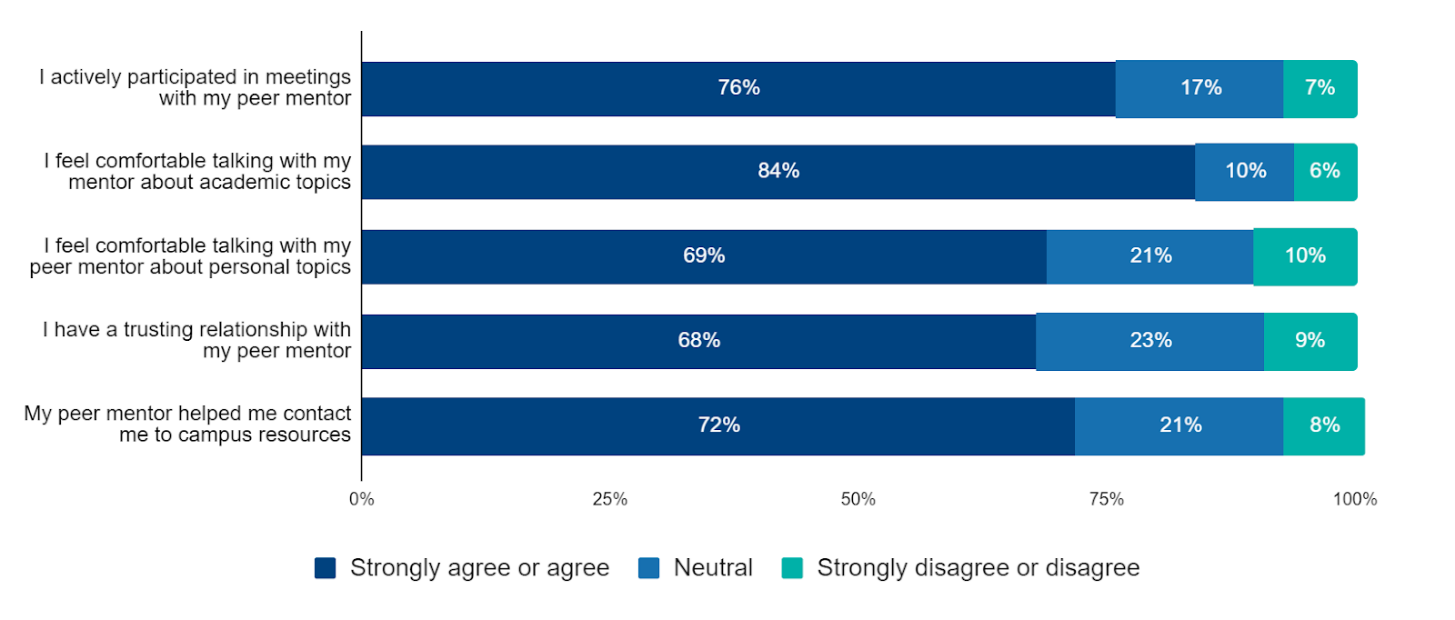
Source: Kessler Scholars Collaborative 2023 Program Staff Survey
In addition, by the spring semester, 96 percent of scholars across all years of study expressed confidence in their abilities to complete academic and social tasks at college, such as attending office hours, managing time effectively, and doing well on exams.
Figure 4: Student respondents’ confidence in their abilities to perform academic and social tasks (n = 368 students)
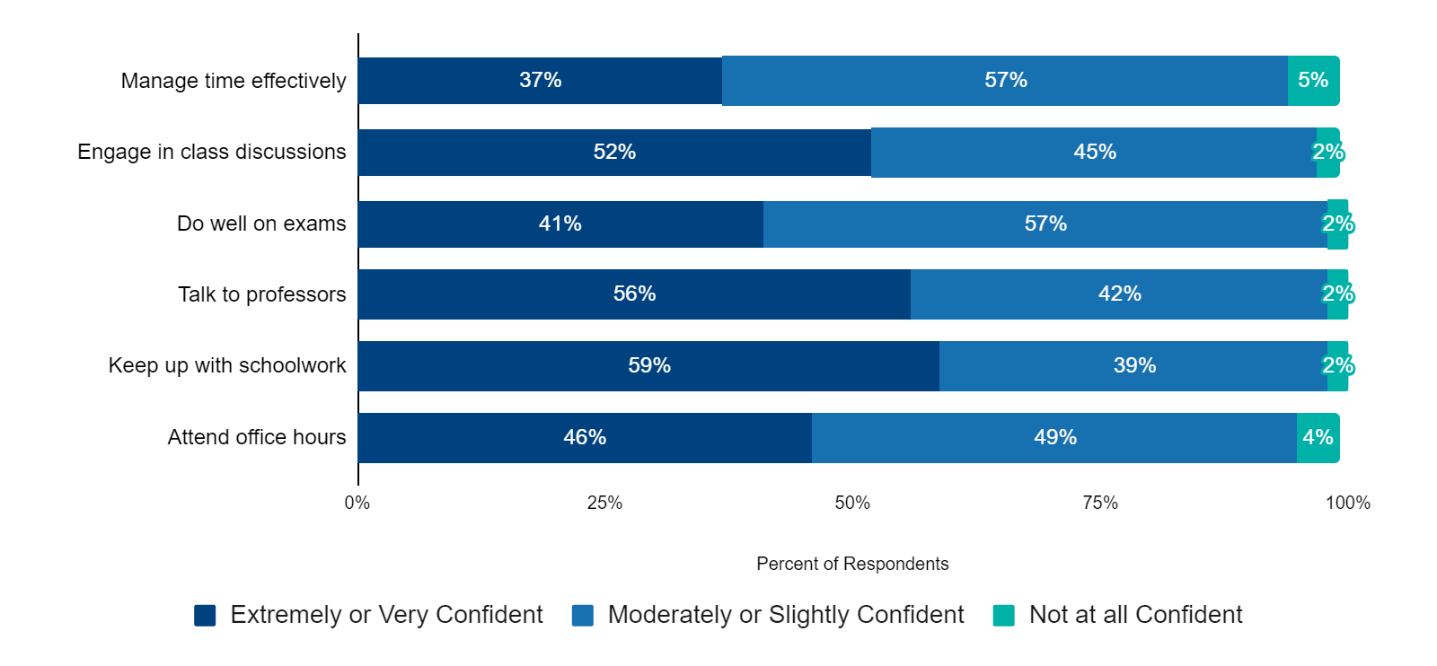
Source: Kessler Scholars 2023 Spring Student Survey
Students’ experiences developing a sense of belonging and mattering
Kessler Scholars feel cared for and supported by the program and report a strong sense of belonging and mattering within these small, tight-knit program communities designed for first-generation students. They report these feelings to a greater degree in their Kessler Scholars cohort compared to the institution as a whole.
Figure 5: Student respondents’ sense of belonging and feelings of mattering within the Kessler Scholars Program and at their institutions (n= 368 students)  Source: Kessler Scholars 2023 Spring Student Survey
Source: Kessler Scholars 2023 Spring Student Survey
Students’ experiences with leadership and professional development
Kessler Scholars are encouraged to take on leadership roles both within and beyond the program and to engage in community service and high-impact practices, which have been linked to improved student engagement and success, particularly for historically underserved students.[14] Within the program, several scholars have gained valuable leadership experience by serving as peer mentors to first-year Kessler Scholars (26 percent) or on the Kessler Scholars student advisory boards (14 percent). Most peer mentors and student advisory board members felt adequately supported by the program to fulfill their responsibilities and viewed these opportunities as valuable leadership experiences.
Figure 6: Student respondents’ experiences as peer mentors (n = 100 students)
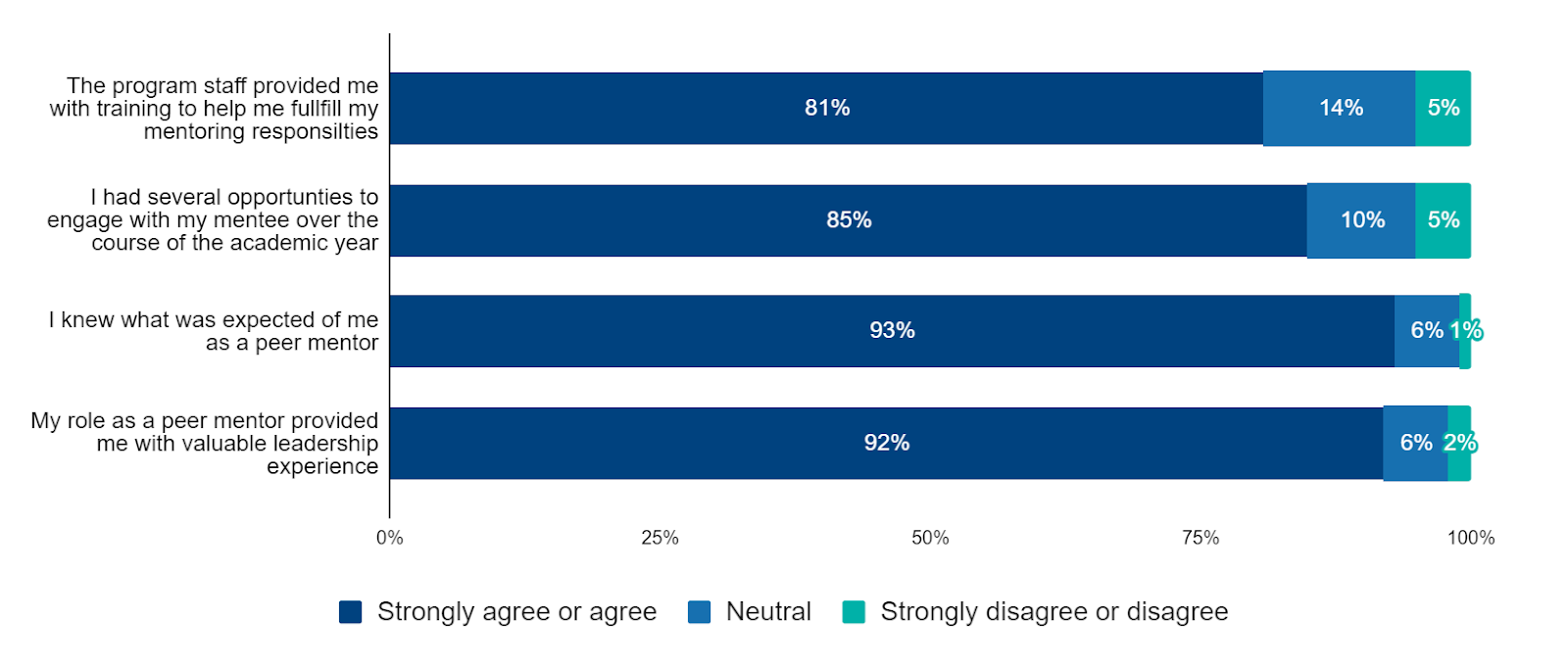
Source: Kessler Scholars 2023 Spring Student Survey
Additionally, many Kessler Scholars are engaged in a variety of high-impact practices such as volunteering or community service, research projects, internships, and study abroad programs.
Figure 7: Student respondents’ engagement in high-impact practices in the academic year 2022-23 (n = 365 students)
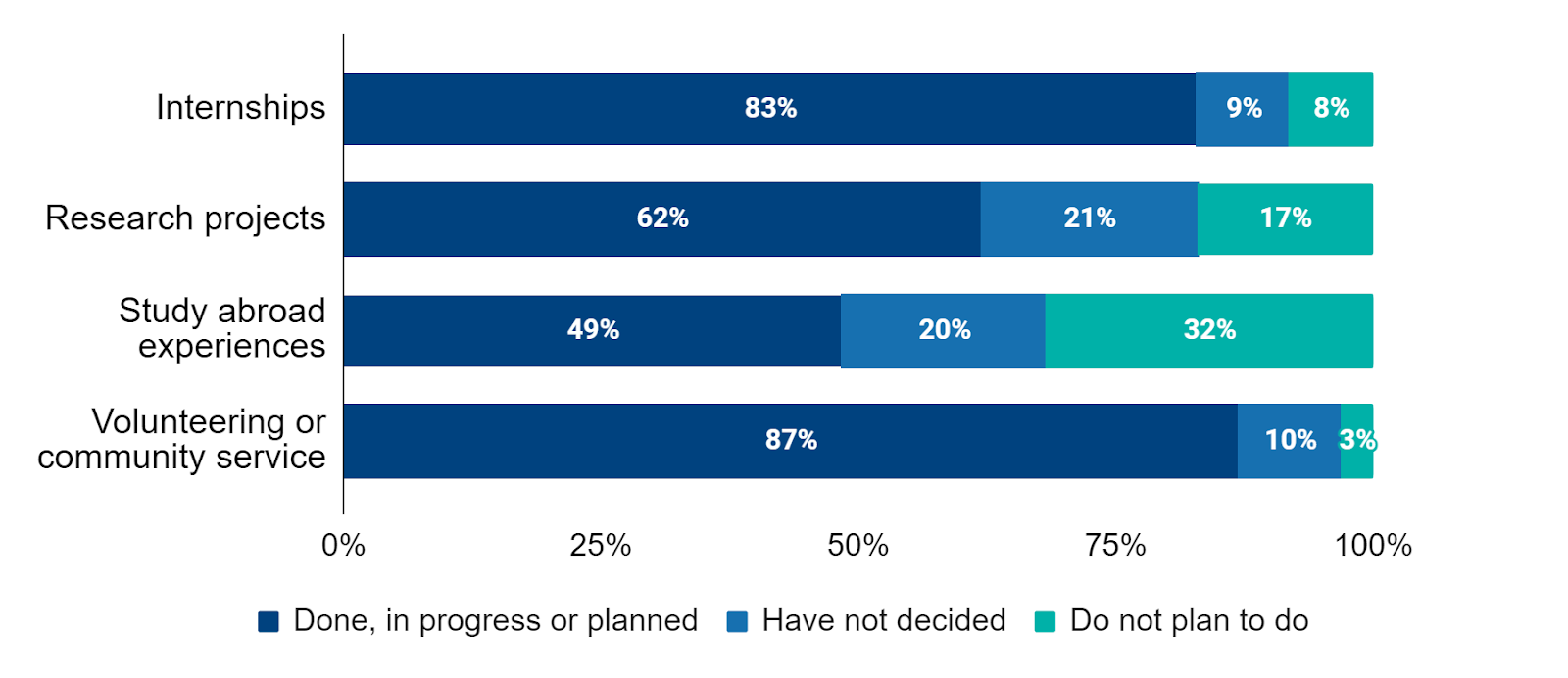 Source: Kessler Scholars 2023 Spring Student Survey
Source: Kessler Scholars 2023 Spring Student Survey
Upper-level Kessler Scholars are offered support, workshops, and resources for setting goals and exploring career and post-graduation options. Of the 46 graduating seniors who responded to a survey of Kessler Scholars in March 2023, 21 percent had secured full-time jobs, 33 percent were pursuing full-time employment, and 13 percent had been accepted to a graduate program beginning in Fall 2023. Additionally, of the 67 percent of these graduating seniors who had discussed their post-graduation plans with Kessler program staff, 97 percent said they found the advice and assistance about post-graduation plans helpful.
“The Kessler Scholars program staff helped me choose a major and career path that related to my personal interests and hobbies throughout college. In addition, they helped me find a graduate program that would help me pursue my interests.”
“Kessler Scholars has given me a lot of experience with mentorship and just connecting with other students which has prompted me to consider roles in higher education after graduation.”
Looking Ahead
This brief focuses on the academic year 2022-23, but during the academic year 2023-24, the Collaborative welcomed over 400 new first-year students and reached more than 800 scholars across its 16 partner campuses. Additionally, the graduating class of 2024 includes the first graduating cohorts at three of the inaugural institutions—Johns Hopkins University, Queens College, and Syracuse University.
The second year of the evaluation focuses on the experiences of first-year Kessler Scholars and explores the targeted support they received through the Kessler Scholars Program during the academic year 2023-2024. Through mixed-methods analysis of data collected through student surveys and focus groups, as well as interviews with program staff, we aim to identify promising practices for supporting first-year, first-generation, limited-income students navigating the transition to college, with a focus on summer support, first-year courses, and peer mentoring.
Endnotes
- “First-generation College Students in 2020,” Center for First-Generation Student Success, https://firstgen.naspa.org/files/dmfile/15405_NASPA_FactSheet-01.pdf. ↑
- Carmen Tym, Robin McMillion, Sandra Barone, and Jeff Webster, “First-Generation College Students: A Literature Review,” Research and Analytical Services, November 2004, https://files.eric.ed.gov/fulltext/ED542505.pdf. ↑
- Ernest T. Pascarella, Christopher T. Pierson, Gregory C. Wolniak, Patrick T. Terenzini, “First-Generation College Students: Additional Evidence on College Experiences and Outcomes,” The Journal of Higher Education 75, no. 3 (May/June 2004): 249-284, https://thrive.arizona.edu/sites/default/files/First-Generation%20College%20Students%2C%20College%20Experiences%20and%20Outcomes.pdf, ↑
- Michael J. Stebleton, Krista M. Soria, Ronald L. Huesman Jr., “First-Generation Students’ Sense of Belonging, Mental Health, and Use of Counseling Services at Public Research Universities,” Journal of College Counseling 27, no. 1 (April 2014): 6-20, https://onlinelibrary.wiley.com/doi/10.1002/j.2161-1882.2014.00044.x. ↑
- Sarah E. Whitley, Grace Benson, Alexis Wesaw, “First-Generation Student Success: A Landscape Analysis of Programs and Services at Four-Year Institutions,” NASPA Student Affairs Administration in Higher Education, 2018, https://www.luminafoundation.org/wp-content/uploads/2019/03/first-gen-student-success.pdf. ↑
- Rachel Fulcher Dawson, Melissa S. Kearney, James X. Sullivan, “Comprehensive Approaches to Increasing Student Completion in Higher Education: A Survey of the Landscape,” National Bureau of Economic Research, February 2021, https://www.nber.org/system/files/working_papers/w28046/w28046.pdf. ↑
- Joseph A. Kitchen, Rosemary Perez, Ronald Hallett, Adrianna Kezar, Robert Reason, “Ecological Validation Model of Student Success: A New Student Support Model for Promoting College Success Among Low-Income, First-Generation, and Racially Minoritized Students,” Journal of College Student Development 62, no. 6 (November-December 2021): 627-642, https://muse.jhu.edu/article/850733. ↑
- Lia Lumauig and Ifeatu Oliobi, “Announcing a New Partnership with the Kessler Scholars Collaborative,” Ithaka S+R, 6 June 2022, https://sr.ithaka.org/blog/announcing-a-new-partnership-with-the-kessler-scholars-collaborative/. ↑
- “Kessler Scholars Collaborative Evaluation Plan Brief,” Kessler Scholars Collaborative and Ithaka S+R, https://sr.ithaka.org/wp-content/uploads/2024/07/Kessler-scholars-collaborative-evaluation-plan-brief.pdf. ↑
- Cathy Hearn, Mollie Bush, Megan Legault, Victoria Bigelow, Claire Boeck, and Kolby Gadd, “2021-2022 Evaluation Report,” Center for Education Design, Evaluation, and Research (CEDER) at the University of Michigan, https://marsal.umich.edu/projects/kessler-scholars-collaborative. ↑
- “Who are the Kessler Scholars and Program Staff that Participate in the Collaborative?” Ithaka S+R, https://sr.ithaka.org/wp-content/uploads/2024/05/SR-Who-are-the-Kessler-Scholars-and-Program-Staff-that-participate-in-the-Collaborative.pdf. ↑
- “How does the Collaborative Support Program Staff at Participating Institutions?” Ithaka S+R, https://sr.ithaka.org/wp-content/uploads/2024/05/SR-How-does-the-Collaborative-support-program-staff-at-participating-institutions.pdf. ↑
- “What Were the Experiences and Outcomes of Students Who Participated in the Kessler Scholars Program?” Ithaka S+R, https://sr.ithaka.org/wp-content/uploads/2024/05/SR-experiences-and-outcomes-of-Kessler-Scholars-Program-students.pdf. ↑
- Kuh defines high-impact practices as “teaching and learning practices that have significant educational benefits for students who participate in them.”George D. Kuh, “High-Impact Educational Practices,” Peer Review 10, no. 4 (2008): 30-31. ↑